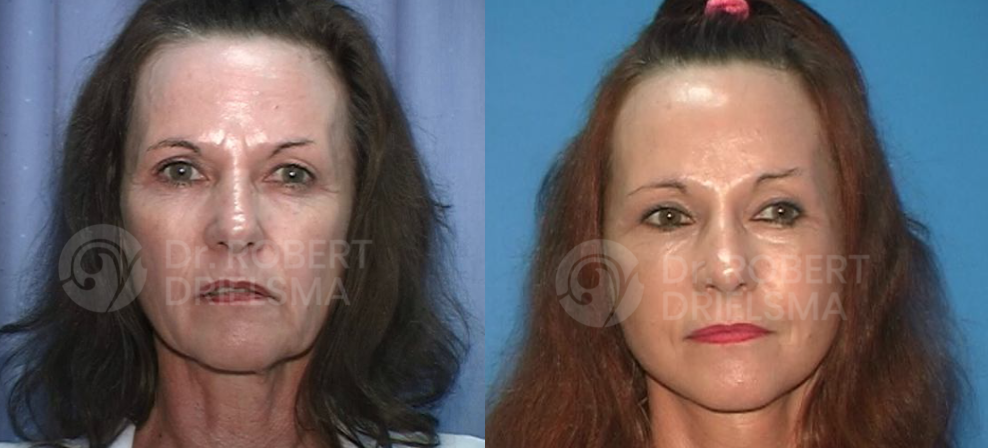Warning: Undefined array key "target" in /home/sh10236/public_html/wp-content/themes/drdrielsma/functions.php on line 72
Warning: Undefined array key "target" in /home/sh10236/public_html/wp-content/themes/drdrielsma/functions.php on line 72
Facelift (rhytidectomy) surgery may be considered for many reasons and is a cosmetic procedure that requires a lot of consideration and research by the patient. Facelift (rhytidectomy) surgery may address a range of features, including the cheekbones, neck, and jawline. Patients also often seek to address the areas below the eyes and even the forehead.
BEFORE AND AFTER PHOTOSNon surgical treatments may be considered by patients in the 30 to 45 year age group but do become less effective as you age. “Gravitational effects” of skin looseness and sagging become noticeable as we age and the role of surgery to address this may become present.
Facelift (rhytidectomy) surgery is an operation designed to address the effects of ageing to the face. This may also include the effects of sun damage, as well as the skin of the face losing its elasticity and tightness.
Facelift (Rhytidectomy) Sydney
Operative procedures, such as a face (rhytidectomy) and neck lift (platysmaplasty), brow lift (browplasty) and blepharoplasty (eye lift) are all cosmetic options available to patients. These procedures include removing and tightening loose skin as well as underlying tissue of the lower face, eyes and brow. Facelifting (rhytidectomy) performed by Dr Drielsma involves tightening of the structural deeper layer of the face known as the SMAS layer as well as the skin layer. The judicious use of fat grafting to the cheeks, eyelids and temple is also used. Fat grafting of the face either alone or in combination with lifting procedures is also an available option.

Facelift FAQ
How long does the operation take?
How long do I have to stay in hospital?
When can I return to activities?
How long does it last?
Are there any risks?
As with any surgical procedure, there is a small risk of complications. Surgery and anaesthesia is very safe and it is most unlikely you will experience any difficulty. However, there is a small chance that a minor complication such as bleeding or infection may occur.
Scarring
Expect scarring following surgery to be minimal and take up to two years to mature. It is possible for scarring around the earlobe to result in tightness and tethering. Scarring behind the ear can become lumpy and uncomfortable for a number of months. Scarring in front of the ear may cause tightness. These are all uncommon. Swelling and bruising: Bruising and swelling is usual and varies with each patient from being virtually invisible to extensive. Most bruising and swelling settles over 1 to 2 weeks, although some take longer.
You will notice some relaxing in the tightness of the face as the final swelling settles. Stretching of the skin by post-operative swelling is an inevitable minor consequence and is usually complete within about three months. Fine wrinkles may return during this time.
Nerve injury
Facelift (rhytidectomy) involves facial dissection very close to the course of the facial nerve. This major nerve of the face is responsible for movement of the face, particularly around (rhytidectomy).
Anaesthetic
You will be receiving a general anaesthetic and your anaesthetist will be discussing with you possible discomforts following anaesthesia. Your anaesthetist will answer any questions you have regarding your anaesthetic at the time of surgery.
What about costs?
**Individual results may vary. All surgery carries risks.
You should get a second opinion from an equally qualified Specialist Plastic Surgeon before proceeding with surgery.
